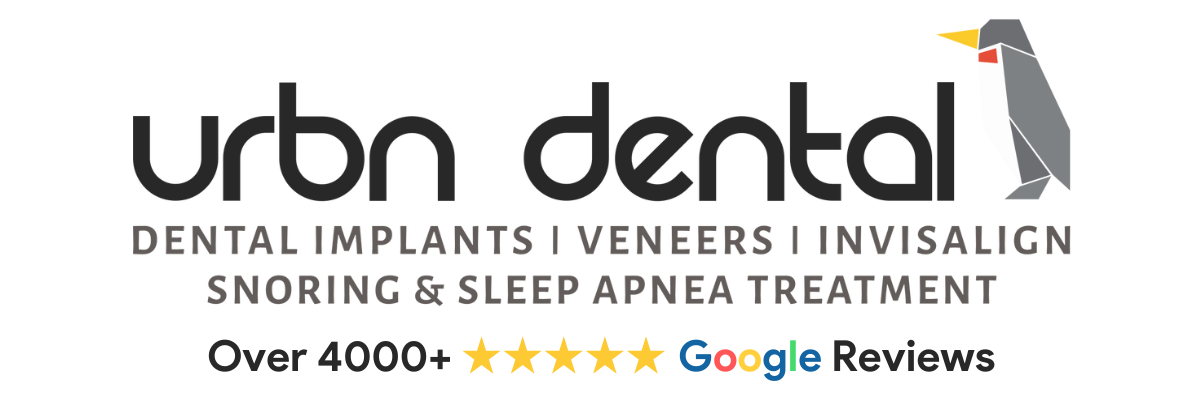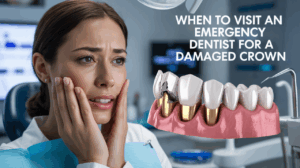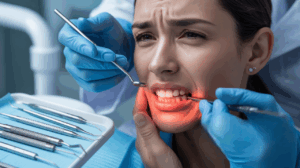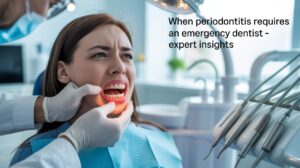Dental emergencies usually strike when you least expect them. A sudden fall, a sports injury, or unexpected pain can leave you shocked and unsure of what to do next. But in these moments, knowing how to react can help you prevent long-term damage and save your smile.
If you’re in Houston, getting emergency dental care quickly can make all the difference. This guide walks you through every step to handle a dental emergency and shows you how to find the right urgent dental care in Houston when you need it most.
Step 1: Stay Calm and Assess the Situation
Panic is the enemy during a dental emergency. When you stay calm, you can think clearly and act quickly.
Start by taking a deep breath. Check the area for signs of bleeding, swelling, broken teeth, or intense pain. This quick assessment helps you decide how serious the situation is and whether you need to head to an emergency dentist immediately.
Step 2: Stop Any Bleeding Right Away
If you’re bleeding from the mouth, act fast.
Rinse your mouth gently with warm water. Then, place a clean piece of gauze or soft cloth over the bleeding spot. Press down firmly (but not too hard), and hold it in place for about 10 minutes.
If the bleeding doesn’t stop or keeps coming back, don’t wait. You need to visit an emergency dental clinic in Houston as soon as possible.
Step 3: Save Any Broken or Lost Tooth Fragments
If a tooth has chipped, cracked, or broken off, try to find the pieces. Handle them gently to avoid further damage.
Rinse the fragments with clean water—no scrubbing. Then place them in a clean container filled with milk or your own saliva. Bring these fragments with you to the dentist. In many cases, they can be reattached or used to guide restoration.
Step 4: Act Fast If a Tooth Is Knocked Out
A knocked-out tooth is one of the most urgent dental emergencies. If you act within 30 minutes, there’s a good chance the tooth can be saved.
Hold the tooth by the crown (the part you usually see in your mouth), not the root. If it’s dirty, rinse it gently with water. Do not scrub or remove any tissue attached to the root.
If possible, try to place the tooth back in its socket. If that’s too difficult, store it in milk or tuck it inside your cheek. Then, I rushed to an emergency dentist in Houston. Keeping the tooth moist and intact increases the chances of successful re-implantation.
Step 5: Reduce Pain and Swelling Safely
Pain and swelling are common in dental emergencies, but you can manage them temporarily.
Use an over-the-counter pain reliever like ibuprofen. Be sure to follow the instructions on the label. Apply a cold pack or wrapped ice to the outside of your cheek for about 15–20 minutes at a time to bring down swelling and numb the pain.
Never place aspirin directly on the gums or teeth—it can burn the tissue and make things worse.
Step 6: Avoid Hot, Hard, or Crunchy Foods
Stick to soft foods like yogurt, mashed potatoes, or smoothies until you see a dentist.
Avoid chewing on the injured side of your mouth, and don’t eat anything too hot, cold, or hard. This reduces the risk of further damage or pain while your mouth is already in a sensitive state.
Step 7: Get to an Emergency Dentist in Houston Quickly
Not all dental offices are equipped to handle emergencies, so it’s important to find a clinic that offers urgent dental care Houston .
Call ahead and explain your symptoms clearly. Many Houston-based emergency dentists reserve time slots for urgent cases and can see you the same day. Delaying professional treatment could make the situation worse and lead to permanent damage.
Common Types of Dental Emergencies
Understanding what qualifies as a dental emergency helps you know when to act fast. Some of the most frequent issues include:
- Severe toothaches or dental abscesses that don’t go away
- Chipped, cracked, or broken teeth
- Knocked-out teeth due to trauma
- Lost crowns, fillings, or dental appliances
- Injuries to your lips, gums, or tongue
- Swelling or pus in the gums or jaw, especially if accompanied by a fever
- Jaw injuries or difficulty opening and closing your mouth
If you notice any of these symptoms, contact an expert offering Emergency Dental Care Houston immediately.
When Is It Time to Call an Emergency Dentist?
You should call an emergency dentist if you experience:
- Intense, continuous tooth pain that doesn’t subside
- Swelling that spreads to your neck or face
- Difficulty breathing, speaking, or swallowing
- Bleeding that doesn’t stop after 10 minutes
- A knocked-out or broken adult tooth
Some dental issues may seem small at first but can become serious if ignored. It’s always better to get them checked right away.
Be Prepared for Future Dental Emergencies
The best time to prepare is before the emergency happens. Here’s how you can stay ready:
- Save your dentist’s emergency number in your phone.
- Keep a dental first-aid kit with essentials like gauze, a clean container, painkillers, and a cold compress.
- Wear a mouthguard during sports or high-contact activities.
- Visit your dentist regularly—small issues can be caught before they become emergencies.
Being prepared helps you stay calm and confident if something goes wrong in the future.
Final Thoughts
Dental emergencies can feel overwhelming. But the right actions, taken at the right time, can save your teeth and protect your health.
Keep calm, manage symptoms carefully, and get in touch with an expert offering Emergency Dental Care in Houston without delay. Small steps today will help you handle any future dental emergency with confidence.
FAQs
What qualifies as a dental emergency?
Any injury, infection, or pain that requires immediate attention is a dental emergency. Common examples include broken teeth, abscesses, knocked-out teeth, or ongoing bleeding.
Should I go to the ER for a dental emergency?
Only visit the emergency room for major trauma, facial swelling that affects breathing, or deep cuts. Most dental problems need a dentist—not a hospital.
How can I manage dental pain before seeing the dentist?
Take OTC pain medication like ibuprofen, use a cold compress on the cheek, and avoid touching the affected area. Then, head to a Houston urgent dental care clinic as soon as possible.
What should I do if my crown falls out?
Rinse the crown carefully and try placing it back using over-the-counter dental cement (available at pharmacies). Do not use glue. Visit a dentist for proper repair.




